Lianyungang Intermediate People’s Court jointly held a press conference to crack down on money laundering crimes.
Time: 9:00 on July 30th, 2020.
Venue: Lianyungang Press Conference Hall
Moderator:
Guoqing Yang
Vice President of Lianyungang Central Branch of China People’s Bank
Published by:
Fan haihong
Director, Anti-Money Laundering Department, Nanjing Branch, People’s Bank of China
Hao Zhang
President of Lianyungang Central Branch of China People’s Bank
Li jiangrong
Deputy Secretary and Vice President of the Party Group of the Municipal Intermediate People’s Court
Zhang kexiao
Member of Party Group and Deputy Procurator-General of the Municipal People’s Procuratorate
Cheng shanquan
Division Chief of Economic Investigation Detachment of Municipal Public Security Bureau
Issue: Work related to combating money laundering in Lianyungang.
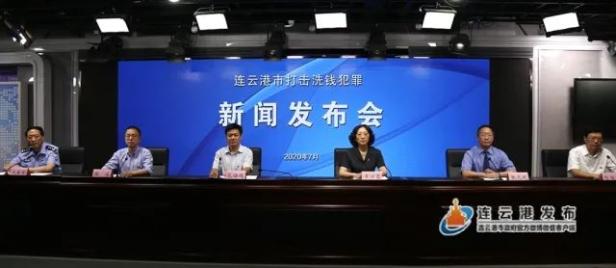
杨国清:各位新闻界的朋友,各位领导,同志们,大家上午好!近年来,党中央和国务院高度重视反洗钱工作,习近平总书记等中央领导同志多次就反洗钱工作作出重要批示和指示。在相关部门的通力协作下,我市反洗钱工作也取得积极成效。今年7月7日,连云港市首例洗钱犯罪案件——王某洗钱案宣判。今天,我中心支行联合市中级人民法院、市人民检察院、市公安局召开“连云港市打击洗钱犯罪新闻发布会”。
出席今天发布会的领导有:中国人民银行南京分行反洗钱处处长范海鸿同志,中国人民银行连云港市中心支行党委书记、行长张浩同志,连云港市中级人民法院党组副书记、副院长李江蓉同志,连云港市人民检察院党组成员、副检察长张克晓同志,连云港市公安局经侦支队支队长成善全同志,他们准备向大家通报我市打击洗钱犯罪的相关情况并答记者问。
我是中国人民银行连云港市中心支行副行长杨国清,本场新闻发布会由我主持。
今天应邀出席新闻发布会的媒体朋友有:新华日报、省广电台、江苏法制报、新华网、中国江苏网、现代快报、扬子晚报、网易、连云港日报、连云港电视台、港城365、连云港发布、苍梧晚报等多家省市主流媒体代表。
Today, we also invited the responsible comrades of Lianyungang Anti-Money Laundering Joint Conference, some county (district) courts, procuratorates and public security bureaus to attend this press conference.
Today’s press conference has two agendas. First, release the work of combating money laundering crimes in Lianyungang; The second is to answer questions from media friends.
First of all, let’s proceed to the first agenda: Please invite Comrade Zhang Hao, Party Secretary and President of Lianyungang Central Sub-branch of China People’s Bank, to inform our city about the work of combating money laundering crimes.
Zhang Hao: Good morning, friends from the press, leaders and comrades!
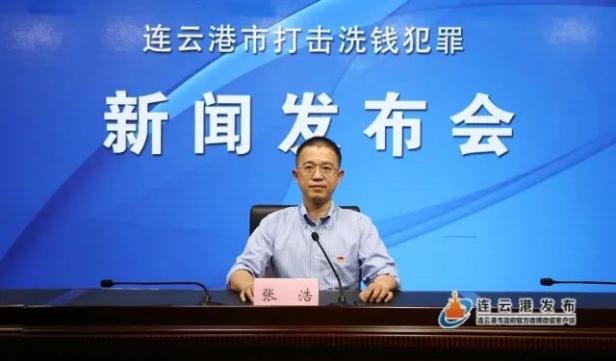
With the rapid development of the financial system and the deepening of economic globalization, the infiltration of money laundering and terrorist financing crimes into the financial system has become increasingly serious, and anti-money laundering has risen to the height of safeguarding national security and financial security. Most money laundering upstream criminal activities involve the flow of funds, leaving traces of suspicious transaction characteristics. Anti-money laundering functional departments and anti-money laundering obligors have the responsibility to monitor, analyze, warn and prevent abnormal transactions. In 2007, the Anti-Money Laundering Law of People’s Republic of China (PRC) clarified the role of anti-money laundering in curbing money laundering crimes and related crimes from the legislative level. In 2017, the Opinions of the General Office of the State Council on Improving the Supervision System and Mechanism of Anti-Money Laundering, Anti-Terrorist Financing and Anti-Tax Evasion clarified the cooperation responsibilities of 23 members of the Inter-Ministerial Joint Conference on Anti-Money Laundering, and provided the highest-level mechanism guarantee for combating money laundering crimes.
As the administrative department in charge of anti-money laundering in China, the People’s Bank of China has set up the Anti-Money Laundering Bureau, the China Anti-Money Laundering Monitoring and Analysis Center as the Financial Intelligence Center (FIU) of China, and the branches of the People’s Bank of China have set up anti-money laundering functional departments. By guiding and requiring anti-money laundering agencies to effectively identify customers, monitor and screen large-value transactions and suspicious transactions, timely capture information on abnormal capital flows, improve the standardization and transparency of financial transactions, and weave a "safety net" for the whole society to protect normal economic and financial activities from infringement. From 2015 to 2019, branches of the People’s Bank of China transferred a total of 14,405 clues to the investigation organs, which provided strong financial intelligence support for the country to prevent and combat money laundering and upstream crimes.
The People’s Bank of China has closely focused on the overall work of the party and the state and implemented the major work arrangements of the central government. The head office and branches at all levels have carried out effective cooperation with law enforcement departments such as the central and local public security inspection laws within their jurisdiction to jointly crack down on money laundering and terrorist financing crimes, and achieved remarkable results. Among them, from 2015 to 2019, the People’s Bank of China and its branches assisted the investigation organs in conducting anti-money laundering investigations on 11,606 suspected money laundering crimes, helped to crack 2,103 suspected money laundering and various illegal crimes, and urged people’s courts at all levels to judge 283 cases for "money laundering crime" in Article 191 of the Criminal Law and 281,600 cases for "concealing and concealing the crime" in Article 312 of the Criminal Law. In 205 cases, the crime of harboring, transferring and concealing drugs and stolen goods was judged in Article 349 of the Criminal Law, giving full play to the important role of anti-money laundering in safeguarding national security and social stability.
At the level of Lianyungang, the Lianyungang Central Sub-branch of the People’s Bank of China has continuously deepened its cooperation with the public security organs and other departments since it performed the duties of the administrative department in charge of anti-money laundering. Through the monitoring of anti-money laundering funds and the screening and judgment of suspicious transaction reports, it has transferred a large number of case clues to the investigation organs, and assisted in cracking a series of major cases through anti-money laundering investigation and case consultation. The role of anti-money laundering in preventing and cracking down on money laundering and related crimes has become increasingly prominent.
In terms of building anti-money laundering cooperation mechanism and forming joint efforts to prevent and combat money laundering crimes: our central sub-branch requested the municipal government to establish a joint conference system for anti-money laundering and anti-terrorist financing in Lianyungang, with 18 departments including the Municipal People’s Bank, the Municipal Supervision Commission, the Municipal Intermediate Court, the Municipal Procuratorate, the municipal government office and the Municipal Public Security Bureau. The Municipal People’s Bank is the lead unit of the joint conference, and the office of the joint conference on anti-money laundering and anti-terrorist financing is located in Lianyungang Central Sub-branch of the People’s Bank of China, which is responsible for anti-money laundering and anti-terrorist financing. Under the framework of the joint meeting system, Lianyungang Central Sub-branch of the People’s Bank of China has successively signed bilateral cooperation agreements with relevant member departments, the Anti-Money Laundering Cooperation Mechanism with Lianyungang Public Security Bureau, the Memorandum of Cooperation on Joint Prevention, Containment and Combating of Suspected Smuggling and Money Laundering with Lianyungang Customs, the Memorandum of Cooperation on Joint Prevention of Money Laundering, Terrorist Financing and other illegal and criminal activities with real estate authorities, and the bilateral cooperation agreement with Lianyungang National Security Bureau. Previously, it also signed a Memorandum of Cooperation with Lianyungang People’s Procuratorate to jointly prevent and combat suspected corruption and money laundering; Lianyungang Anti-Money Laundering Reporting Center was established. Any unit or individual can report money laundering activities to the Anti-Money Laundering Reporting Center, forming a strict organizational system to prevent and combat money laundering and various economic crimes.
In terms of strengthening fund monitoring and actively transferring case clues to investigation organs: from 2015 to 2019, our central sub-branch found and received 275 key suspicious clues, and conducted 16 anti-money laundering investigations on 16 clues after screening, and transferred 89 clues to investigation organs.
In terms of deepening anti-money laundering cooperation and cooperating with public security organs and other departments to crack down on all kinds of illegal crimes: from 2015 to 2019, our central sub-branch assisted the investigation organs in conducting anti-money laundering investigations for 14 times and international investigations for 4 times on 11 cases suspected of upstream crimes of money laundering, and assisted in solving 15 cases, involving underground banks, drugs, smuggling, illegal fund-raising, black and evil, tax crimes, online gambling, terrorist financing and other types of crimes. Among them, in 2015, the clues of the "910" case supervised by the Ministry of Public Security, involving a total amount of 10 billion yuan, were discovered and transferred to the police. Our central branch and the Municipal Public Security Bureau set up a joint task force to participate in the case investigation, and the case was rated as "Top 10 boutique underground money house cases" by the Ministry of Public Security in 2015. In 2017, it assisted the Customs Private Bureau in cracking the "1106" crystal smuggling case supervised by the General Administration of Customs.
In actively promoting the sentencing of money laundering crimes and maintaining social fairness and justice, our central branch has been continuously promoting the sentencing of money laundering crimes within its jurisdiction, benefiting from the above-mentioned good anti-money laundering cooperation mechanism. On July 7, 2020, Haizhou District People’s Court pronounced a verdict on Wang’s money laundering case, which was a clue to the money laundering case discovered by our central branch during the anti-money laundering visit of the Economic Investigation Brigade of Haizhou District Public Security Bureau. Knowing that his father, Wang Moufu, was engaged in illegal fund-raising activities, Wang still provided several bank cards under his name to Wang Moufu for circulating funds and income from fund-raising fraud crimes, and assisted Wang Moufu in transferring and depositing funds, totaling 1,358,400 yuan. Before the case, there was no convicted money laundering case in our city to learn from, and the public security department was very cautious in the characterization of criminal acts: Haizhou District Public Security Bureau specially asked our central branch to start an anti-money laundering investigation to help collect the flow of money from Wang’s suspected money laundering crime, and the municipal and district public security bureaus and our central branch held several meetings on the evidence collection of Wang’s suspected money laundering crime; Before the public prosecution, the city and district procuratorates held several case analysis meetings to study the applicable law, and did a lot of meticulous and rigorous work for the investigation and trial of the case. On November 2, 2018, Wang was criminally detained by Haizhou Public Security Bureau on suspicion of money laundering. On February 20, 2020, Haizhou District Procuratorate prosecuted Wang for money laundering. On July 7, 2020, the Haizhou District People’s Court made a judgment against Wang, sentenced Wang to money laundering and sentenced him to two years in prison according to law.He was also fined RMB 100,000, and the illegal income of Wang was recovered. At present, the judgment has taken effect. The verdict of Wang’s money laundering case is not only the first money laundering case pronounced in our city since the promulgation of the Anti-Money Laundering Law, but also the first case in our province including five cities in northern Jiangsu, including Xu, Huai, Yan, Lian and Suqian. Although the value of Wang’s money laundering case is not large, the verdict of the case will definitely have a deterrent effect on providing fund accounts, transferring funds by means of transfer, and helping to conceal and cover up the proceeds of crime and its proceeds, and will also have positive significance in curbing related upstream crimes and maintaining social fairness and justice.
That’s all for my post, thank you!
Guoqing Yang: Thank you, President Zhang Hao. Next, let’s move on to the second agenda, and ask reporters and friends to ask questions about the trial of money laundering cases that the people are concerned about. Before asking questions, please explain the media you represent and who is in charge.
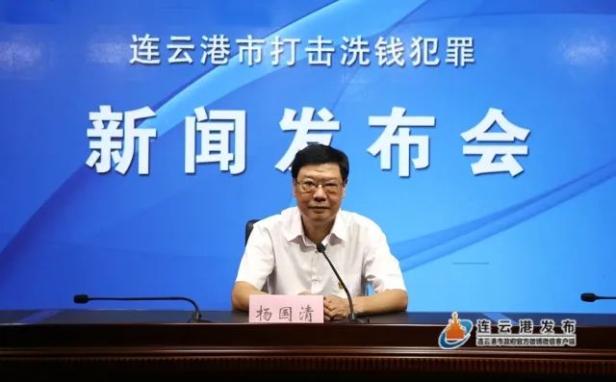
Reporter: The common people are unfamiliar with the crime of money laundering. I would like to ask Vice President Li of the Intermediate People’s Court, what is the crime of money laundering?
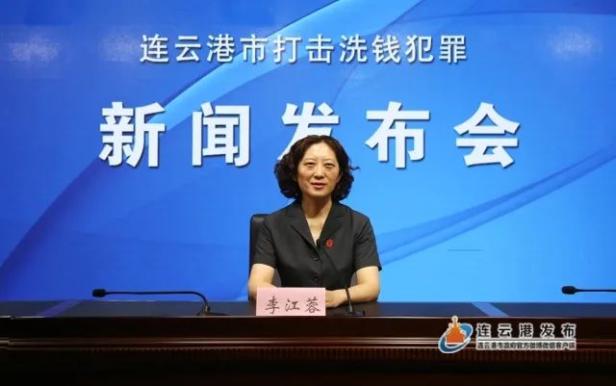
Li Jiangrong: Thank you for your concern about judicial work. In practice, there are many cases of breaking the law because they don’t understand the law, and popularizing relevant legal knowledge to the media and the public is also one of the purposes of holding this press conference. According to Article 191 of the Criminal Law of People’s Republic of China (PRC), the crime of money laundering refers to the illegal gains and gains of drug crimes, organized crimes of underworld nature, terrorist activities, smuggling crimes, corruption and bribery crimes, crimes of disrupting financial management order, and financial fraud crimes, which provide fund accounts or help to convert property into cash, financial bills and securities in order to cover up and conceal their sources and nature. Or assist in the transfer of funds through transfer or other settlement methods, or assist in the remittance of funds abroad, or cover up or conceal the source and nature of criminal proceeds and their proceeds by other means. The harm of money laundering crime mainly includes the following aspects:
1. Money laundering facilitates criminals to hide and transfer illegal gains, provides further financial support for criminal activities, and encourages more serious and larger-scale criminal activities.
2. Money laundering activities weaken the macro-economic control effect of the country and endanger the healthy development of the economy.
3. Money laundering encourages and breeds corruption, corrupts social atmosphere, leads to social injustice and affects national reputation.
4. Money laundering activities damage the legitimate rights and interests of legitimate economies, undermine the micro-competitive environment of the market, and undermine the effective operation of the market mechanism and fair competition.
5. Money-laundering activities cause the irregularity of capital flow and affect the stability of financial markets.
6. Money laundering activities undermine the foundation of sound operation of financial institutions and increase the legal risks and operational risks of financial institutions.
We also remind the general public that money laundering crimes are not far away from our lives, and helping relatives and friends "open an account" or "take an account" may lead to jail. Therefore, when a relative or friend asks to borrow a bank account to "pay a visit", he must ask the real source of the money and the destination of the money. When the other party lures with a "benefit fee", don’t break the law for petty gain.
Thank you!
Reporter: I would like to ask Governor Zhang of the People’s Bank of China that there is no clear victim of money laundering, so why should we crack down on money laundering crimes?
Zhang Hao: Although there is no clear victim of money laundering, its seven categories of upstream crimes are all serious criminal crimes that endanger society. Money laundering provides support for upstream crimes and helps to conceal and conceal the income from upstream crimes and the source and nature of its income. It is an act of "creating an ill will", which not only endangers the healthy economic development and financial security of the country, but also hinders the financial management and judicial organs from investigating and dealing with criminal activities, encourages crime, breeds corruption and corrupts social atmosphere. Combating money laundering crimes is of positive significance to deter money laundering crimes, curb related upstream crimes and safeguard social fairness and justice.
Thank you all.
记者:请问人民银行南京分行范处长,打击洗钱罪案件有什么样的国际国内背景?
范海鸿:首先感谢您对反洗钱工作的关注。
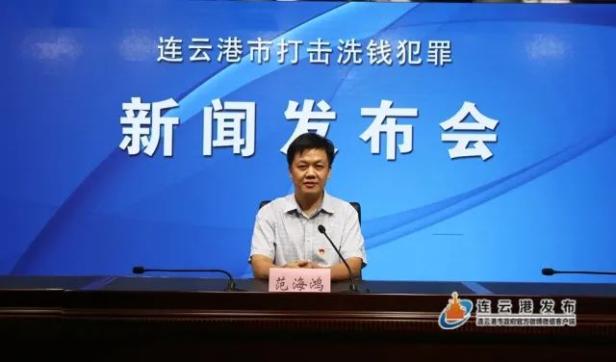
近年来,党中央和国务院高度重视反洗钱工作,习近平总书记等中央领导同志多次就反洗钱工作作出重要批示和指示。2019年2月,反洗钱国际权威组织——金融行动特别工作组(FATF)第三十届第二次全会审议通过我国第四轮互评估报告,充分认可了近年来我国反洗钱和反恐怖融资工作取得的积极进展,但同时也指出了一些亟待解决的问题,如执法部门查处案件、使用金融情报、开展国际合作工作时侧重上游犯罪,而相对忽视洗钱犯罪。因此,从去年年底开始,人民银行总行牵头与最高检建立洗钱罪个案会商机制,并与最高检、最高法就修订《反洗钱法》、《最高人民法院关于审理洗钱等刑事案件具体应用法律若干问题的解释》等开展调研和商讨,积极推动洗钱罪的定罪宣判。今年5月15日,最高检召开了加强惩治洗钱犯罪专题会议,就检察机关推进反洗钱工作中存在的问题及下一步工作方案进行了深入研究,积极采取措施增加起诉洗钱犯罪案件数量,加大反洗钱工作力度,预防和遏制洗钱犯罪已经成为高层的共识。
Thank you!
Reporter: May I ask Director Fan of the People’s Bank of China Nanjing Branch, as the administrative department in charge of anti-money laundering in Jiangsu Province, what achievements have been made in combating money laundering crimes? What are the specific arrangements for promoting the conviction of money laundering crimes?
Fan Haihong: Thank you for your attention to the work of combating money laundering in Jiangsu Province. Judging from the conviction and judgment of money laundering in our province, since the promulgation and implementation of the Anti-Money Laundering Law in 2007, there have been only 11 cases of money laundering in Jiangsu Province, including four cases of money laundering in this year, namely, Lu Mou’s money laundering case in Nanjing, Sun Mouping’s money laundering case in Nantong, Wang Mou’s money laundering case in Lianyungang and Taizhou.
Based on the fact that there are few cases of money laundering in our province, this year, Nanjing Branch of the People’s Bank of China has successively signed a Cooperation Agreement with the Provincial Public Security Department to jointly prevent, curb and crack down on illegal financial crimes such as money laundering, and signed a Cooperation Mechanism on Strengthening the Punishment and Prevention of Money Laundering and Related Criminal Activities with the Provincial Higher People’s Procuratorate, and jointly promoted the work of cracking down on money laundering crimes in terms of joint consultation, supervision of major clues and case assistance, strengthening information exchange, timely reporting the acceptance, review and prosecution of suspected money laundering and related criminal clues. Under the framework of the above cooperation agreement, the Nanjing Branch of the People’s Bank of China and the Provincial Public Security Department jointly held three clue analysis and judgment meetings and one major case supervision meeting this year; Conduct case consultation with the Provincial Higher People’s Procuratorate twice; The central branches of the People’s Bank of China have also strengthened cooperation with local judicial departments such as the Public Security Law to combat money laundering crimes, forming a linkage working mechanism to promote the sentencing of money laundering crimes throughout the province. In the next step, our branch will continue to play the role of the anti-money laundering administrative department, strengthen organizational leadership, coordinate and communicate with the public security inspection law from the branch level, screen and transfer clues of suspected money laundering crimes, start anti-money laundering investigations in time, fully assist the investigation organs in investigating and collecting evidence of suspected money laundering crimes, and fully promote the progress of the conviction of money laundering crimes in our province.
My answer is here, thank you!
Reporter: I would like to ask Deputy Procurator-General Zhang of the Municipal Procuratorate. Just now, the leaders of Nanjing Branch of the People’s Bank of China also mentioned that in May this year, the Supreme People’s Procuratorate held a special video conference to make special arrangements for the prosecution of money laundering crimes. What are the planning arrangements for the prosecution of money laundering cases in Lianyungang?
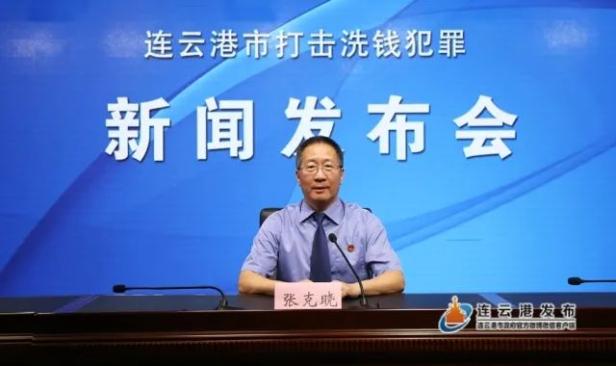
Zhang Kexiao: Thank you for your concern about the prosecution of money laundering crimes by procuratorial organs. Our Lianyungang procuratorate has the following arrangements for the prosecution of money laundering crimes.
First, intensify the punishment of money laundering crimes, and effectively change the practice of "emphasizing upstream crimes and neglecting money laundering crimes". Those who handle upstream crimes should simultaneously examine whether they are suspected of money laundering crimes. If an accomplice in upstream crimes, concealing criminal proceeds, illegally operating underground banks and other acts constitute money laundering crimes at the same time, choose a felony and strictly prosecute it according to law.
The second is to improve the cooperation mechanism with the Municipal People’s Bank and public security organs, and strengthen functional linkage. For major, complex and difficult money laundering cases, establish a discussion mechanism with relevant units to jointly study and judge, and unite efforts.
The third is to strengthen the simultaneous review of upstream and downstream crimes and broaden the clue channels. In view of the fact that the upstream crime of money laundering involves various criminal and procuratorial business lines, the municipal procuratorate should strengthen overall leadership, strengthen the simultaneous review of whether the downstream crime constitutes money laundering crime in the review, arrest, review and prosecution of specific seven types of upstream crime cases, and review and handle the cases involving seven types of crimes simultaneously. Form a working mechanism to crack down on the whole chain of money laundering crimes and complete the initial goal of "increasing the number of cases prosecuted for money laundering crimes" proposed by the Supreme People’s Procuratorate.
The fourth is to set up a financial professional case-handling team to enhance professional ability. Strengthen the theoretical and practical exploration of anti-money laundering, pay attention to the practice of handling cases, study the difficult problems in the judicial practice of money laundering crimes, and think about the suggestions for improving the anti-money laundering working mechanism. The research on practical problems of money laundering crime written by the procuratorate of our city has been approved by the People’s Procuratorate of Jiangsu Province in 2020.
Thank you all.
Reporter: I would like to ask the Municipal Public Security Bureau to form a detachment. What are the main methods of money laundering at present, and how can citizens avoid their own information being used by money laundering crimes?
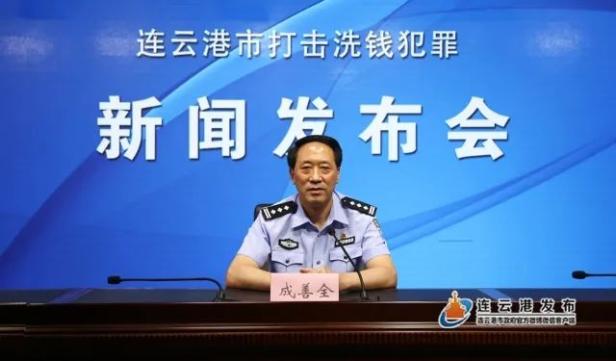
Cheng Shanquan: Thank you for your concern about combating money laundering.
According to the cases of money laundering crimes reported by various places, we have concluded that there are mainly the following seven methods in current money laundering activities:
First, use the legal financial system to launder money. Criminals launder illicit money through banks or non-bank financial institutions, transfer and hide illegal gains and their proceeds.
Second, the use of underground banks for money laundering. The criminals transferred the stolen money out of the country through underground money houses.
Third, use the Internet to launder money. Criminals use online banking to transfer illicit money, and some even launder it through online gambling.
Fourth, money laundering through cash smuggling. Criminals carry with them or hide a large amount of cash in vehicles to enter and leave the country.
Fifth, money laundering through investment. Criminals launder money by investing in hotels, setting up companies, buying commercial houses and investing in real estate.
Sixth, the use of import and export trade for money laundering. Cross-border transfer of illicit money by falsely reporting import and export prices or forging relevant trade documents.
Seventh, use the securities and futures market for money laundering. The criminals put the stolen money into the securities and futures market, buy stocks, futures or other wealth management products, and transfer funds.
The public security organs also remind everyone that all citizens should especially raise their awareness of the social harm of money laundering and establish anti-money laundering awareness. Financial transactions should be conducted through legal financial institutions, not through illegal payment platforms; Don’t lend your identity documents to others, open a company, open an account, open a telephone, etc. Do not provide bank account numbers, bank cards and third-party payment accounts such as Alipay and Tenpay to others for use. The public security organs will severely crack down on those who engage in money laundering crimes or lend relevant documents and materials to others for money laundering crimes, and will never be soft.
Guoqing Yang: Because of the time, the question session is over. Thanks to the media friends for coming! Please continue to strengthen the publicity and reporting on Lianyungang’s anti-money laundering work, do a good job of public opinion supervision, and create a good public opinion atmosphere for the development of Lianyungang’s anti-money laundering cause. This press conference is over. Thank you!
Original title: "Lianyungang Intermediate People’s Court and a number of units held a press conference to crack down on money laundering crimes"
Read the original text